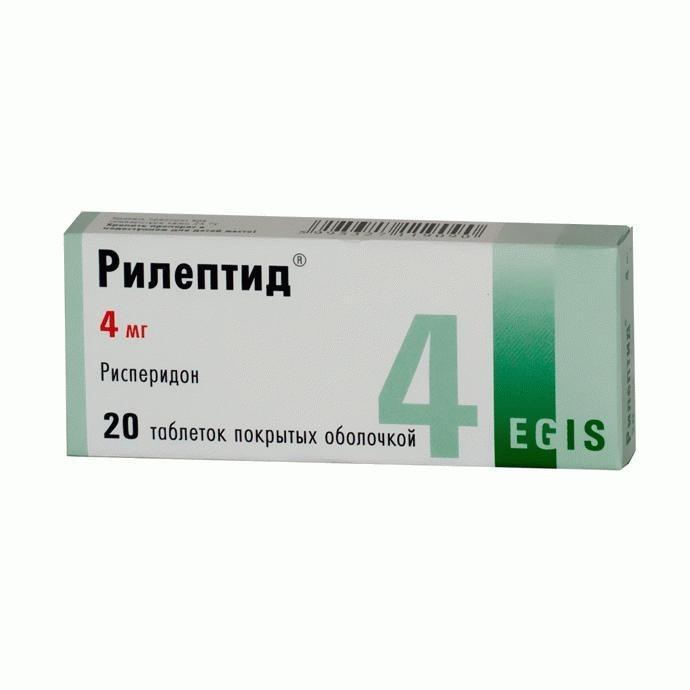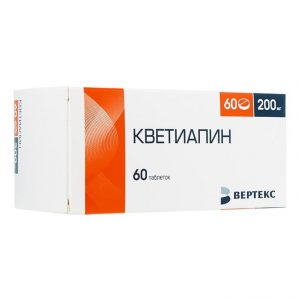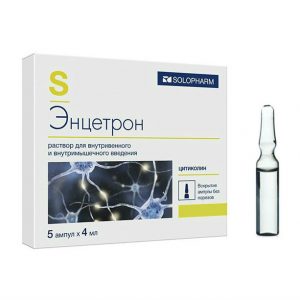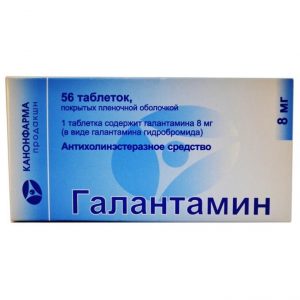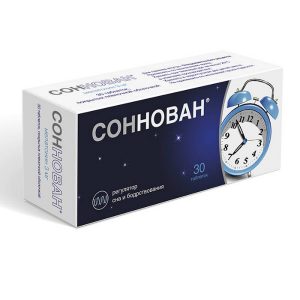Description
Latin name
Rileptid
release form
tablets, film-coated
Packing
In 1 blister pack of 10 tablets. In a cardboard bundle 2 blisters.
Pharmacological action
Antipsychotic drug, benzisoxazole derivative. It also has a sedative, antiemetic and hypothermic effect.
Risperidone, a selective monoaminergic antagonist, has a high affinity for serotonin 5-HT 2 and dopamine D 2 receptors. Contacting 1 -adrenoreceptors and somewhat weaker – with histamine H 1 -receptors and 2 -adrenoreceptors. It has no tropism for cholinergic receptors.
Antipsychotic effect due to blockade of dopamine D 2 receptors of the mesolimbic and mesocortical system. Sedative effect is due to blockade of adrenoreceptors of the reticular formation of the brain stem antiemetic effect – blockade of the dopamine D2 receptors of the trigger zone of the vomiting center hypothermic effect – blockade of the dopamine receptors of the hypothalamus.
Rileptide reduces the productive symptoms of schizophrenia (delirium, hallucinations), automatism, to a lesser extent, suppresses motor activity and to a lesser extent induces catalepsy than classical antipsychotics. Balanced central antagonism of serotonin and dopamine can reduce the tendency to extrapyramidal side effects.
Risperidone may cause a dose-dependent increase in plasma prolactin concentrations.
Indications
– Acute and chronic schizophrenia and other psychotic disorders with productive and / or negative symptoms.
– Affective disorders in various mental illnesses.
– Behavioral disorders in patients with dementia with symptoms of aggressiveness (outbreaks of anger, physical violence), mental disorders (agitation, delirium) or psychotic symptoms.
– As an adjuvant in the treatment of mania for bipolar disorder.
– As an adjuvant therapy for behavioral disorders in adolescents from 15 years of age and adult patients with reduced intellectual level or mental retardation in cases where destructive behavior (aggressiveness, impulsivity, autoaggression) is leading in the clinical picture of the disease.
Contraindications
– Lactation (breastfeeding).
– Hypersensitivity to the drug.
Caution is advised to use the drug:
– In patients with diseases of the cardiovascular system (including those with chronic heart failure, myocardial infarction, conduction disturbances).
– For dehydration.
– Hypovolemia.
– cerebrovascular accident.
– Parkinson’s disease.
– Convulsions (including a history of).
– Severe renal or hepatic failure.
– For drug abuse or drug dependence.
– In conditions predisposing to the development of pirouette type tachycardia (bradycardia, electrolyte imbalance, concomitant use of drugs that extend the QT interval).
– For brain tumors.
– Intestinal obstruction.
– In cases of acute overdose of drugs.
– In Reye’s syndrome (because the antiemetic effect of risperidone can mask the symptoms of these conditions).
– During pregnancy.
– Patients under the age of 15 years (i.e. safety and efficacy of the drug have not been established).
Pregnancy and lactation
The safety of risperidone during pregnancy has not been studied. The use of Rileptide during pregnancy is possible only if the expected benefit exceeds the potential risk.
Since risperidone and 9-hydroxy-risperidone are excreted in breast milk, if you need to use the drug during lactation, you should stop breastfeeding.
Composition
1 tablet, coated, contains: active substance: risperidone 4 mg
excipients: lactose monohydrate, corn starch, microcrystalline cellulose, magnesium stearate, silicon dioxide colloidal anhydrous, sodium lauryl sulfate
shell composition: Opadry green dye, 400 giromellose, titrohydrola ariavit indigo carmine aluminum varnish, ariavit quinoline yellow aluminum varnish)
Dosage and administration of
In case of schizophrenia: Adults and children over 15 years of age Rileptide is prescribed 1 time / day. or 2 times / day. The initial dose is 2 mg / day. On the second day, the dose should be increased to 4 mg / day. From this point on, the dose can either be maintained at the same level or individually adjusted if necessary. Usually, the optimal dose is 4-6 mg / day. In some cases, a slower dose increase and lower initial and maintenance doses may be warranted. Doses above 10 mg / day. have not shown higher efficacy compared to lower doses and may cause extrapyramidal symptoms. Due to the fact that the safety of doses is higher than 16 mg / day. not studied, doses above this level can not be used. Information on the use of Rileptide for the treatment of schizophrenia in children under 15 years of age is not available.
– Use in elderly patients. For elderly patients, the drug is prescribed in an initial dose of 500 mcg 2 times / day. The dose can be individually increased by 500 mcg 2 times / day. up to 1-2 mg 2 times / day.
Use in case of impaired liver and kidney function: In case of impaired liver and kidney function, the initial dose is 500 mcg 2 times / day. This dose can gradually be increased to 1-2 mg 2 times / day.
Use for drug abuse: In case of drug abuse or drug dependence, the recommended daily dose of the drug is 2-4 mg.
In the treatment of behavioral disorders in patients with dementia: The recommended starting dose is 250 mcg 2 times / day. If necessary, the dose can be individually increased by 250 mcg 2 times / day. no more than every other day. For most patients, the optimal dose is 500 mcg 2 times / day. However, some patients are shown taking 1 mg 2 times / day. Upon reaching the optimal dose, it may be recommended to take the drug 1 time / day.
For bipolar disorder with mania: The recommended starting dose is 2 mg / day. in 1 reception. If necessary, this dose can be increased by 2 mg / day., Not more often than every other day. For most patients, the optimal dose is 2-6 mg / day.
For behavioral disorders in patients with mental retardation: – For patients with a body weight of 50 kg or more, the recommended initial dose of the drug is 500 mcg 1 time / day. If necessary, this dose can be increased by 500 mcg / day. not more often than in a day. For most patients, the optimal dose is 1 mg / day. For some patients, a dose of 500 mcg / day is preferable, while some require a dose increase of up to 1.5 mg / day.
– For patients weighing less than 50 kg, the recommended initial dose of the drug is 250 mcg 1 time / day. If necessary, this dose can be increased by 250 mcg / day. no more than every other day. For most patients, the optimal dose is 500 mcg / day. For some patients, a dose of 250 mcg / day is preferable, while some require an increase in dose to 750 mcg / day.
Long-term use of the drug in adolescents should be carried out under the supervision of a physician.
For the convenience of dosing, the use of the drug is possible: Rileptide tablets 2 mg 20 Aegis Pharmaceutical Plant.
Side effects of
From the nervous system: insomnia, agitation, anxiety, headache sometimes – drowsiness, increased fatigue, dizziness, impaired attention, blurred vision rarely – extrapyramidal symptoms (tremor, rigidity, hypersalivation, bradykinesia, akathisia, acute dystonia), mania or hypomania, stroke (in elderly patients with predisposing factors), as well as hypervolemia (either due to polydipsia or due to the syndrome inadequate secretion of ADH), tardive dyskinesia (involuntary rhythmic movements of mainly the tongue and / or face), neuroleptic malignant syndrome (hyperthermia, muscle rigidity, instability of autonomous functions, impaired consciousness and increased levels creatine phosphokinase), thermoregulation disorders and epileptic seizures.
From the digestive system: constipation, dyspepsia, nausea or vomiting, abdominal pain, increased activity of hepatic transaminases, dry mouth, hypo-or hypersalivation, anorexia and / or increased appetite, increase or decrease in body weight.
From the CCC side: sometimes – orthostatic hypotension, reflex tachycardia or increased blood pressure.
From the hemopoietic organs: neutropenia, thrombocytopenia.
From the endocrine system: galactorrhea, gynecomastia, menstrual irregularities, amenorrhea, weight gain, hyperglycemia and exacerbation of preexisting diabetes mellitus.
From the genitourinary system: priapism, erectile dysfunction, ejaculation disorders, anorgasmia, urinary incontinence.
Allergic reactions: rhinitis, rash, angioedema, photosensitivity.
From the skin: dry skin, hyperpigmentation, itching, seborrhea.
Other: arthralgia.
Drug Interaction
Given that Rileptide primarily affects the CNS, it should be used with caution in combination with other central action drugs and alcohol.
Rileptide reduces the effectiveness of levodopa and other dopamine agonists.
Clozapine reduces the clearance of risperidone.
With the concomitant use of Rileptide and carbamazepine, a decrease in the concentration of the active antipsychotic fraction of risperidone in plasma was observed. Similar effects can be observed when using other inducers of hepatic enzymes.
When co-administered with Rileptide, phenothiazines, tricyclic antidepressants and some beta-blockers may increase plasma risperidone concentrations, but this does not affect the concentration of the active antipsychotic fraction.
When co-administered with Rileptide, fluoxetine may increase the plasma risperidone concentration, to a lesser extent, the active antipsychotic fraction.
When using Rileptide with other drugs that bind to plasma proteins in a high degree, no clinically pronounced displacement of any drug from the plasma protein fraction is observed.
Antihypertensive drugs increase the severity of BP in the background of taking Rileptide.
Overdose
– Symptoms: drowsiness, manifestations of sedation, depression of consciousness, tachycardia, hypotension, extrapyramidal symptoms, in rare cases – prolongation of the QT interval.
– Treatment: The airways should be freely accessible to ensure adequate oxygenation and ventilation. The gastric lavage (after intubation, if unconscious) and the appointment of activated charcoal in combination with a laxative are shown. ECG monitoring should be started immediately to identify possible cardiac arrhythmias. There is no specific antidote. Conduct symptomatic therapy. Continuous medical monitoring and monitoring should continue until the symptoms of intoxication have disappeared.
Storage conditions
– The drug should be stored at a temperature not exceeding 25 ° C.
– Keep out of the reach of children.
– Do not use after the expiration date.
Expiration
5 Chron
Deystvuyuschee substances
Risperidone
Pharmacy terms
Prescription
Dosage form
Dosage form
Tablets
